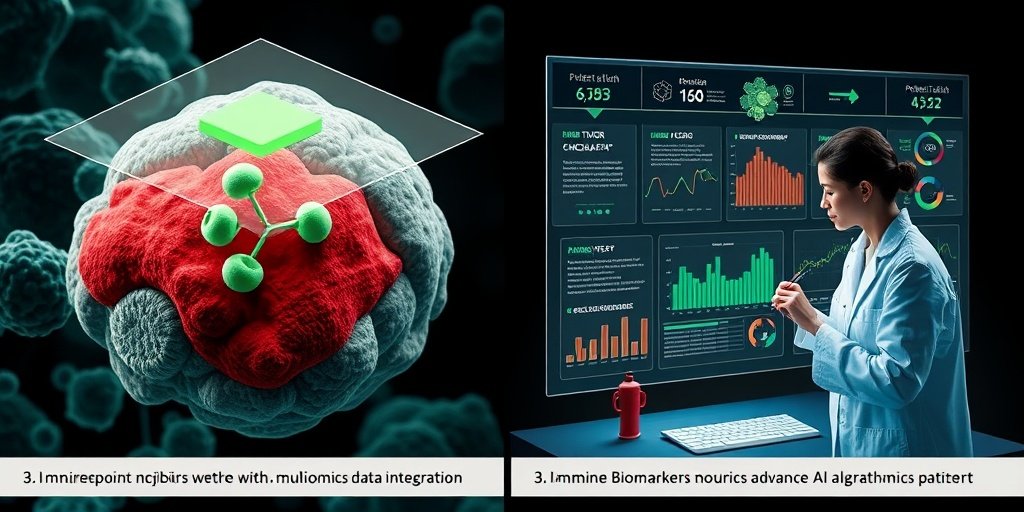⚡ Quick Summary
The rapid development of immune checkpoint inhibitors has transformed cancer therapy by enhancing T cell-mediated antitumor responses. Despite their promise, challenges such as efficacy heterogeneity and immune-related adverse events remain significant hurdles in clinical applications.
🔍 Key Details
- 📊 Focus: Immune checkpoint inhibitors in cancer therapy
- 🧩 Key targets: Lymphocyte activation gene 3, T cell immunoreceptor with immunoglobulin and tyrosine-based inhibitory motif domain, mucin-domain-containing-3
- ⚙️ Strategies: Combination therapies and predictive biomarker research
- 🌱 Innovations: Microbiome regulation, metabolic reprogramming, AI-driven multiomics analysis
🔑 Key Takeaways
- 🚀 Immune checkpoint inhibitors have revolutionized cancer treatment.
- ⚖️ Challenges include variability in patient response and adverse effects.
- 🔬 Emerging targets are crucial for enhancing treatment efficacy.
- 🧬 Combination strategies may improve outcomes for patients.
- 📈 Predictive biomarkers are essential for personalized treatment approaches.
- 🌍 Microbiome and metabolic factors play a role in treatment response.
- 🤖 AI technologies can aid in patient stratification and treatment personalization.
- 📅 Future research is needed to develop reliable predictive models.

📚 Background
The advent of immune checkpoint inhibitors has marked a significant milestone in oncology, enabling the immune system to effectively target and eliminate cancer cells. However, the clinical application of these therapies is complicated by factors such as drug resistance and the unpredictable nature of patient responses. Understanding these challenges is crucial for advancing cancer treatment.
🗒️ Study
This review systematically summarizes the latest advancements in the field of immune checkpoint inhibitors, focusing on emerging targets and combination strategies. It highlights the current research status and limitations of various predictive biomarkers, aiming to provide a comprehensive framework for future developments in precision immunotherapy.
📈 Results
The review identifies several promising targets, including lymphocyte activation gene 3 and mucin-domain-containing-3, which could enhance the efficacy of existing therapies. Additionally, it emphasizes the need for reliable biomarkers to predict treatment outcomes and adverse effects, as well as the potential of innovative technologies like AI-driven multiomics analysis to improve patient stratification.
🌍 Impact and Implications
The findings from this review have significant implications for the future of cancer therapy. By addressing the challenges associated with immune checkpoint inhibitors, researchers can pave the way for more effective and personalized treatment options. The integration of microbiome regulation and metabolic reprogramming into treatment plans could further enhance patient outcomes, making this an exciting area for future research.
🔮 Conclusion
The review underscores the transformative potential of immune checkpoint inhibitors in cancer therapy while highlighting the critical challenges that need to be addressed. By focusing on emerging targets, combination strategies, and innovative technologies, the field can move towards more effective and personalized cancer treatments. Continued research is essential to unlock the full potential of these therapies and improve patient care.
💬 Your comments
What are your thoughts on the advancements in immune checkpoint inhibitors? How do you see these developments impacting cancer treatment in the future? 💬 Join the conversation in the comments below or connect with us on social media:
The Role of Immune Checkpoint Inhibitors in Cancer Therapy: Mechanism and Therapeutic Advances.
Abstract
The rapid development of immune checkpoint inhibitors has fundamentally changed the landscape of cancer treatment. These agents restore T cell-mediated antitumor immune responses by targeting key immune checkpoint molecules, thereby suppressing or eliminating tumors. However, their clinical application still faces multiple challenges, mainly including efficacy heterogeneity, drug resistance, immune-related adverse events. Furthermore, there is still a lack of reliable biomarkers for predicting efficacy and toxicity. More critically, there is absence of precise predictive models that can systematically integrate multiomics features, dynamic tumor microenvironment evolution, and patient individual differences to comprehensively address the above issues. This review systematically summarizes the latest advancements in this field. The main contents include emerging targets like lymphocyte activation gene 3, T cell immunoreceptor with immunoglobulin and tyrosine-based inhibitory motif domain, and mucin-domain-containing-3, combination strategies, and the current research status and limitations of various predictive biomarkers. Moreover, it focuses on the potential of microbiome regulation, metabolic reprogramming, and artificial intelligence-driven multiomics analysis technologies in achieving dynamic patient stratification and personalized treatment. By integrating the frontier research results and clinical insights, the review aims to provide a systematical theory framework and future directions for advancing precision immunotherapy.
Author: [‘Chen H’, ‘Yang H’, ‘Guo L’, ‘Sun Q’]
Journal: MedComm (2020)
Citation: Chen H, et al. The Role of Immune Checkpoint Inhibitors in Cancer Therapy: Mechanism and Therapeutic Advances. The Role of Immune Checkpoint Inhibitors in Cancer Therapy: Mechanism and Therapeutic Advances. 2025; 6:e70412. doi: 10.1002/mco2.70412